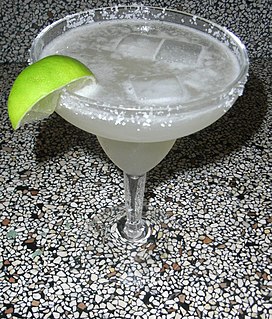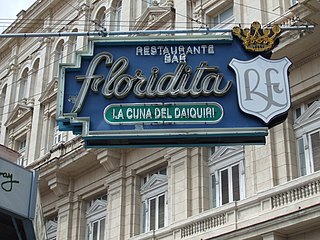
Rum and Coke, or the Cuba libre, is a highball cocktail consisting of cola, rum, and in many recipes lime juice on ice. Traditionally, the cola ingredient is Coca-Cola ("Coke") and the alcohol is a light rum such as Bacardi. However, the drink may be made with various types of rums and cola brands, and lime juice may or may not be included.

Mojito is a traditional Cuban highball. The cocktail often consists of five ingredients: white rum, sugar, lime juice, soda water, and mint. Its combination of sweetness, citrus, and herbaceous mint flavours is intended to complement the rum, and has made the mojito a popular summer drink.

The piña colada is a cocktail made with rum, cream of coconut or coconut milk, and pineapple juice, usually served either blended or shaken with ice. It may be garnished with either a pineapple wedge, maraschino cherry, or both. There are two versions of the drink, both originating in Puerto Rico.

A margarita is a cocktail consisting of tequila, orange liqueur, and lime juice often served with salt on the rim of the glass. The drink is served shaken with ice, blended with ice, or without ice. Although it has become acceptable to serve a margarita in a wide variety of glass types, ranging from cocktail and wine glasses to pint glasses and even large schooners, the drink is traditionally served in the eponymous margarita glass, a stepped-diameter variant of a cocktail glass or champagne coupe.

The Zombie is a Tiki cocktail made of fruit juices, liqueurs, and various rums. It first appeared in late 1934, invented by Donn Beach at his Hollywood Don the Beachcomber restaurant. It was popularized on the East coast soon afterwards at the 1939 New York World's Fair.

The sidecar is a cocktail traditionally made with cognac, orange liqueur, plus lemon juice. In its ingredients, the drink is perhaps most closely related to the older Brandy Crusta, which differs both in presentation and in proportions of its components.

Caipirinha is Brazil's national cocktail, made with cachaça, sugar, and lime. The drink is prepared by mixing the fruit and the sugar together, then adding the liquor. This can be made in a single large glass to be shared among people, or in a larger jar, from which it is served in individual glasses.

Daiquiri is a family of cocktails whose main ingredients are rum, citrus juice, and sugar or other sweetener.

A sour is a traditional family of mixed drinks. Sours belong to one of the old families of original cocktails and are described by Jerry Thomas in his 1862 book How to Mix Drinks.
A Scorpion Bowl is a communally shared alcoholic tiki drink served in a large ceramic bowl traditionally decorated with wahine or hula-girl island scenes and meant to be drunk through long straws. Bowl shapes and decorations can vary considerably. Starting off as a single-serve drink known as the Scorpion cocktail, its immense popularity as a bowl drink in tiki culture is attributed to Trader Vic.

The Fine Art of Mixing Drinks is a book about cocktails by David A. Embury, first published in 1948. The book is noteworthy for its witty, highly opinionated and conversational tone, as well as its categorization of cocktails into two main types: aromatic and sour; its categorization of ingredients into three categories: the base, modifying agents, and special flavorings and coloring agents; and its 1:2:8 ratio for sour type cocktails.
Drink mixers are the non-alcoholic ingredients in mixed drinks and cocktails. Mixers dilute the drink, lowering the alcohol by volume in the drink. They change, enhance, or add new flavors to a drink. They may make the drink sweeter, more sour, or more savory. Some mixers change the texture or consistency of the drink, making it thicker or more watery. Drink mixers may also be used strictly for decorative purposes by changing the color or appearance of the drink. They also simply increase the volume of a drink, to make it last longer.

A "fizz" is a mixed drink variation on the older sours family of cocktail. Its defining features are an acidic juice and carbonated water.

The Bacardi cocktail is a cocktail made primarily with Bacardi Superior. It is served as a "pre-dinner" cocktail.

A Sea Breeze is a cocktail containing vodka with cranberry juice and grapefruit juice. The cocktail is usually consumed during summer months. The drink may be shaken in order to create a foamy surface. It is considered an IBA Official Cocktail.
The Bay Breeze is a cocktail which has a Cape Codder as its base, with the addition of pineapple juice. The drink is also sometimes called a Downeaster, Hawaiian Sea Breeze, or a Paul Joseph. This cocktail is similar to the Sea Breeze, an IBA Official Cocktail with grapefruit juice.

La Bodeguita del Medio is a restaurant-bar in Havana (Cuba). It is a famous tourist destination because of the personalities which have patronized it: Salvador Allende, the poet Pablo Neruda, the artist Josignacio and many others. La Bodeguita lays claim to being the birthplace of the Mojito cocktail, prepared in the bar since its opening in 1942, although this is disputed. The rooms are full of curious objects, frames, photos, as well as the walls covered by signatures of famous or unknown customers, recounting the island's past.

Floridita or El Floridita is a historic fish restaurant and cocktail bar in the older part of Havana, Cuba. It lies at the end of Calle Obispo, across Monserrate Street from the National Museum of Fine Arts of Havana. The establishment is famous for its daiquiris and for having been one of the favourite hangouts of Ernest Hemingway in Havana. The bar now boasts a life size bronze statue of Ernest Hemingway positioned in his favourite spot at the end of the bar. On a small plaque hanging in El Floridita, hangs Hemingway's signed quote: "My mojito in the Bodeguita del Medio and my daiquiri in the Floridita".
















